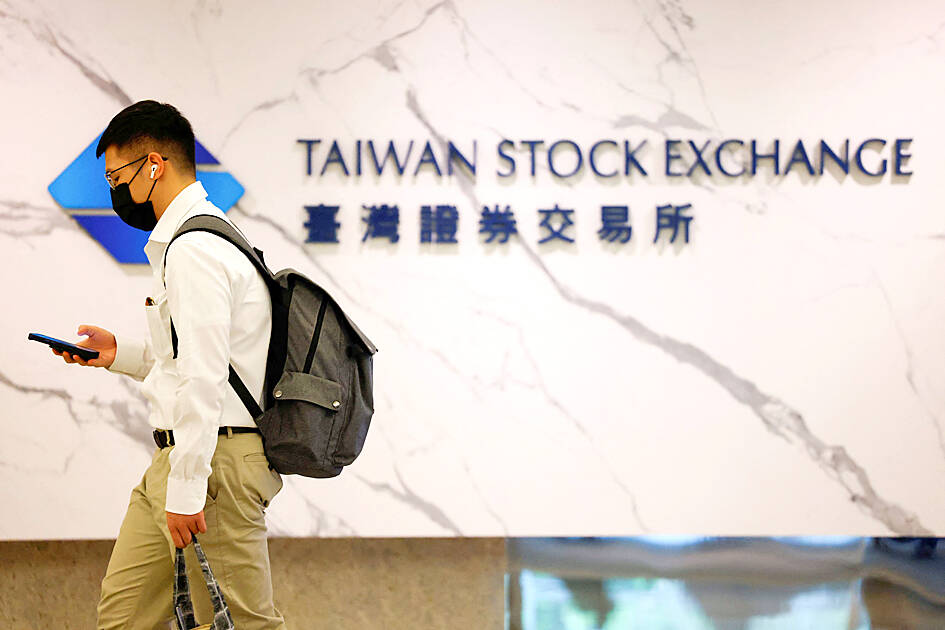All listed firms in Taiwan are required to file a sustainability report this year and complete the disclosure by the end of August to showcase their dedication to environmental, social and governance (ESG) principles, according to the Financial Supervisory Commission (FSC).
Listed companies with a paid-in capital of less than NT$2 billion (US$610.8 million) are required to prepare a sustainability report for last year starting from this year, the commission said. Firms with larger capital already did so last year, it added.
As of August last year, 1,020 firms listed on the Taiwan Stock Exchange (TWSE) or the Taipei Exchange had filed the report for the previous year, constituting 56 percent of the total, data published on the commission’s Web site showed.

Photo: Carlos Garcia, Reuters
That includes 578 mandatory and 442 voluntary submissions, the commission said. Among them, 613 companies obtained third-party assurance in filing their report, it added.
To assist companies in preparing the report, the TWSE has included a sustainability report generation function on its ESG digital platform, which went online on May 6 last year.
After several listed companies were invited to conduct trial generation, the exchange would formally launch the function this month after system adjustments based on the companies’ feedback.
However, the commission reminded listed companies to improve the quality of their sustainability information and avoid greenwashing and untrue statements, which would reduce public trust and affect market competitiveness, it said.
A sustainability report contains qualitative and quantitative information on listed firms’ ESG metrics and insights into their sustainability strategy, goals and initiatives, Taipei-based public relations firm IR Trust Corp (笠信) said.
Firms that fail to file the sustainability report would have difficulty securing bank financing or becoming components of index funds in the future, as banks and fund houses support ESG practices, IR Trust vice president Sandy Cheng (鄭友慈) said last month.
Costs for preparing sustainability report have become more reasonable —from NT$4 million two to three years ago to NT$600,000 these days, Cheng said.
Still, non-tech firms are less ready for the sustainable development trends and in great need of ESG consultancy, she said.

IN THE AIR: While most companies said they were committed to North American operations, some added that production and costs would depend on the outcome of a US trade probe Leading local contract electronics makers Wistron Corp (緯創), Quanta Computer Inc (廣達), Inventec Corp (英業達) and Compal Electronics Inc (仁寶) are to maintain their North American expansion plans, despite Washington’s 20 percent tariff on Taiwanese goods. Wistron said it has long maintained a presence in the US, while distributing production across Taiwan, North America, Southeast Asia and Europe. The company is in talks with customers to align capacity with their site preferences, a company official told the Taipei Times by telephone on Friday. The company is still in talks with clients over who would bear the tariff costs, with the outcome pending further

WEAKER ACTIVITY: The sharpest deterioration was seen in the electronics and optical components sector, with the production index falling 13.2 points to 44.5 Taiwan’s manufacturing sector last month contracted for a second consecutive month, with the purchasing managers’ index (PMI) slipping to 48, reflecting ongoing caution over trade uncertainties, the Chung-Hua Institution for Economic Research (CIER, 中華經濟研究院) said yesterday. The decline reflects growing caution among companies amid uncertainty surrounding US tariffs, semiconductor duties and automotive import levies, and it is also likely linked to fading front-loading activity, CIER president Lien Hsien-ming (連賢明) said. “Some clients have started shifting orders to Southeast Asian countries where tariff regimes are already clear,” Lien told a news conference. Firms across the supply chain are also lowering stock levels to mitigate

NEGOTIATIONS: Semiconductors play an outsized role in Taiwan’s industrial and economic development and are a major driver of the Taiwan-US trade imbalance With US President Donald Trump threatening to impose tariffs on semiconductors, Taiwan is expected to face a significant challenge, as information and communications technology (ICT) products account for more than 70 percent of its exports to the US, Chung-Hua Institution for Economic Research (CIER, 中華經濟研究院) president Lien Hsien-ming (連賢明) said on Friday. Compared with other countries, semiconductors play a disproportionately large role in Taiwan’s industrial and economic development, Lien said. As the sixth-largest contributor to the US trade deficit, Taiwan recorded a US$73.9 billion trade surplus with the US last year — up from US$47.8 billion in 2023 — driven by strong

RESHAPING COMMERCE: Major industrialized economies accepted 15 percent duties on their products, while charges on items from Mexico, Canada and China are even bigger US President Donald Trump has unveiled a slew of new tariffs that boosted the average US rate on goods from across the world, forging ahead with his turbulent effort to reshape international commerce. The baseline rates for many trading partners remain unchanged at 10 percent from the duties Trump imposed in April, easing the worst fears of investors after the president had previously said they could double. Yet his move to raise tariffs on some Canadian goods to 35 percent threatens to inject fresh tensions into an already strained relationship, while nations such as Switzerland and New Zealand also saw increased